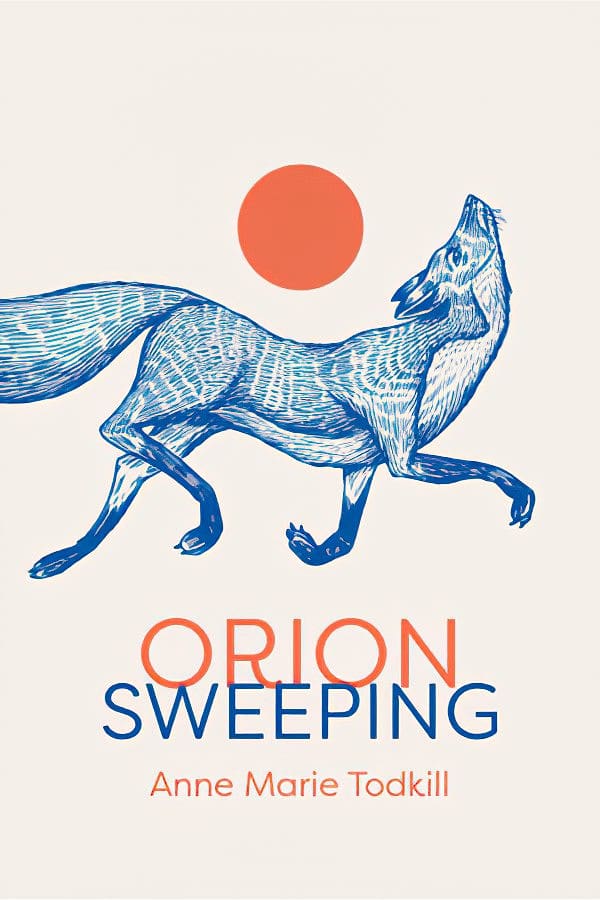Review: Orion Sweeping by Anne Marie Todkill
Reviewed by Pearl Pirie
Orion Sweeping by Anne Marie Todkill (Brick Books)
8.75 x 5.75 Inches | 88 Pages
Publication Date: April 1, 2022
Trade Paperback ISBN:9781771315692
Orion Sweeping by Anne Marie Todkill has a cover of a pen and ink fox and moon by Arthur Balitskiy I’d consider framing. Divided into four self-explanatory sections: “Earth”, “Air”, “Familia”, “Loss Lessons” and “Assisi Variations”, the book has some overlap with Nuclear Family by Jean van Loon (McGill Queens University Press 2022), Both talk about the literal and figurative fall out of nuclear testing. I recall voting for “Strontium-90” in Arc’s Poem of the Year contest and was glad to see it come to print. My encapsulation of the book is “happy” which is perhaps contrary to this subject, but the book arcs from remembering Los Alamos. After these poem the books diverge, van Loon’s into family and Todkill into the yearning and burning world outside of human interaction, among the cherished other species. When Todkill talks of people, it is processing the present, rather than delving into deep past.
Unlike books that invoke the wonder of other species, this does not do the seemingly obligatory hectoring last chapter of how we have destroyed it all. She starts with the destruction and moves into the continual genesis.
It is the angle as much as the subject. As Todkill put it, (p. 9) “Any vantage is enough to reposition history:/ some hold it close/as a stone ’s throw, /a Tonka-toy catastrophe”. The world is a threatening place but expressed with striking forms, as in “Route Options: a prayer to St. Christoper”,(p. 12) “Hide from me the flare /of roadside.crosses’/unfading flowers.”
She has a groundedness and an attentiveness to small details as shown in “Trove” (p. 15) “I set rows of seeds / as white as grubs..They will shoulder through/ the ground after rain” There’s the optimism despite. Seeds and self “shoulder through”, a lovely verb. The unity struck me of the metaphor of seeds as being grubs, both things of the earth that grow and transform, embodying how life itself by nature transforms. That entire poem phrase by phrase can’t have a letter changed. A perfect little gem.
After the nuclear mess made by humans, come the predators, the various four-footed mammals to take back the earth and poems. What did we see, was it wolf (p. 19) “taking the measure of our doubt, /then vanishing.”
When we take to the (section) “Air”, we enter the realm of birds. She has an interesting tack, referring to the sounds of wild geese “skidding into gravity” with “all that migratory muscle” to brake in (p. 27) “the restlessness/ of all things normal and recurrent.” An interesting aspect to consider. There are our constants like clay and there are our constant of longer loops of seasons that reassure. She is plainspoken but the language has a sweet distillation and compression.
Even the section “Familia” is through the lens of animals, plants and objects and what endures or fails to. For example, p. 47, “I’d have to say/that in the family inventory/of things that didn’t last,/
the double concrete laundry tub/was the most surprising.” We are not shown as separate or separable from the rest.
She has a suprising and compact way of telling with specifics and astute turns of phrase “there’s no remedy/for chance.” (“Fall Risk”, p. 53). “Loss Lessons” puts us in humble context. If all is lost with people, still there are birds. Still there is the world. The planet is not anthropocentric, only people are.
She makes an interesting point on loss, as not being only lack of contact, but lack of meaningful connection (“Biographical Fallacy”, p. 75) and “Fish Science” (p. 76) “I read his taciturnity as he muttered/one or two facts/about the habits of fish/ as a kind of tenderness/ toward the world/
(by which I mean/an understanding).” Indeed, knowing about and knowing are distinct. Poets have a habit of listing species name instead of conveying how web of life intermeshes.
The last section of the book is historical fiction from the 1200s. It matches in voice. It gives voice to a wolf, stepping back from the primacy of perspective that must be human. It underscores the constant warlike tendency of our bent human brain, setting us apart from the other animals, as inferiors. Yet among us we have St. Francis de Assissis who maintain the importance and connection of the other species we are lucky enough to be among.
Orion Sweeping by Anne Marie Todkill (Brick Books)
Orion Sweeping was shortlisted 2023 Gerald Lampert Memorial Award from the League of Canadian Poets! Read the shortlist.
Pearl Pirie is a queer concussed writer living in rural Quebec. Her fourth poetry collection, footlights is from Radiant Press. the pet radish, shrunken (Book*hug, 2015) won the Archibald Lampman Award. Her poems have been included in Best Canadian Poetry in English twice, and in various anthologies. Her forthcoming chapbook is Adding Up to This (Catkin Press, 2023), She runs Chalkpaths manuscript editing service, and Studio Nouveau workshops. www.pearlpirie.com or www.Patreon.com/PearlPiriePoet
Anne Marie Todkill has lived mainly in her home town, Ottawa, but has been setting down new roots in Wollaston Township, Ontario, where she lives off-grid with her husband. She spent many years as a medical and academic editor, but never strayed far from her lifelong, intersecting preoccupations with writing and the natural world. She has won Arc Poetry Magazine’s Poem of the Year contest, was a recipient of Arc’s Diana Brebner Prize, and placed first – twice – in The New Quarterly’s Nick Blatchford Occasional Verse Contest. She is also a past winner of The Malahat Review’s Creative Nonfiction Prize, and her winning entry in Malahat’s Novella Contest was subsequently anthologized in Best Canadian Stories. Orion Sweeping is her first book.

